- Home
- James Joyce
A Very Irish Christmas Page 7
A Very Irish Christmas Read online
Page 7
Chapter IV
THE CRIB
WHILE ALL THIS WAS GOING on, Big Michael was sitting, snug and comfortable, in the chimney-corner, opposite the wife, and she knitting, knitting away still. Not a word was passing. She had Michael’s supper ready for him, hot and tasty, the same as ever. But he had no goo for it. What did he care was it good or bad! How could he feel gay and riz up in himself, the way a body should at the Christmas, when he knew well Herself had been crying away while he had been down at the stable?
If only she’d cheer up! If only she’d agree to have the place dressed out, and the Crib and all the other little things done the same as ever! It would do herself good, and they might be having a happy Christmas after all, even if there was only the two of them there with themselves! But he said nothing. Big as Michael was, and little as the Woman was that owned him, it was she had the upper hand in the house. And good right, too; she being a very understanding person, and considered to be a good adviser of a woman all over Ardenoo. Michael was slow, but he was wise enough to give in to the wife. So now when she showed no wish for any of the things he was so made upon, he said no more about them; only after a while says he, “I believe it’s what I’ll take a streel off to see is the cow all right in the stable below….”
But what he really wanted was, to get away from the queer, unhappy feel of the silent kitchen. He thought, too, he’d like another sight of the dressed-out stable and the big Candle he had lit there. He meant to stop a bit with those Christmas signs, and the ass, and the munch, munch of the cow, filling the place with her fragrant breath.
Wasn’t it a pity of the world that Herself was having none of the pleasure? If only he could tell her what he had been doing! If only he could get her to come, too, and see how lovely the stable looked!
As he passed out on the door, the Vanithee looked after him. A kind of pity rose warm in her heart, as she saw the fretted appearance was upon the big man, like a cowed dog, with his tail drooping between his legs.
All the bygone Christmas Eves they had put in there together! Kind, pleasant times, with little old nonsense and laughing, that no one understood, only themselves! Art had been there, to be sure! He had been the delight of the first of their Christmases, and the same always, till he went off. But was it Michael’s fault that the son wasn’t there yet? Sure poor Michael had done nothing to fret her! It wasn’t he had neglected to write! And wasn’t it full as bad for him, Michael, that had always been the fond father to Art! And had never rightly overed the boy’s quitting off the way he did! Oh, if only they had Art there again! To have him going off with the father of a morning, cutting turf, or making hay, or doing a bit of ploughing, and the two of them in to their dinners and off again!… Why, to have that good time back, she’d even welcome the poor-lookin’ little scollop of a thing, and give her share of the old home!…
Poor Michael! He that loved the Christmas! Like a child, he was! Most men are, if they have any good in them; and God help them if they get a woman that doesn’t understand that, and can’t make allowances when they don’t grow up!
Mrs. Moloney was as quick as Michael was slow. So, while he’d be thinking about it, she had a stool over at the dresser and was up on it, feeling for the Crib on the top shelf.
It was there, safe enough, and it wrapped in a newspaper. A small little contraption of a thing it was, that she had bought off Tommy the Crab, the peddling man, years before. Paid sixpence for it, too; and cheap he told her it was at that money.
To see it first, it was no more than a middling sizeable Christmas card. But it was really in three, or maybe four, halves that drew out like a telescope. The first part showed the Kings kneeling with their offerings and crowns upon their heads; then you could see the Shepherds, with their crooks and they kneeling, too; and in the middle of them all, the Mother herself, with the Holy Child upon her knee. St. Joseph was at one side, and the ox and the ass at the other; all complete, even to a grand Star of silver paper, shining on the top of it all.
Mrs. Moloney put the Crib into one of the small square windows and drew it out. Then she went back to the dresser for the candles to light it up with. It looked nothing wanting them.
Not common candles she was going to use, but what had been blessed at Candlemas, and that she had kept put by very carefully.
“I mustn’t take them all,” she thought, “the way, if one of us was to take and die sudden, there would be a Candle ready to put into the dying hand, to light the soul on its way! But there’s a good few, and so …”
Four she took for the four evangelists, and was just lighting them up, when suddenly the door burst open, and with a rush and a laugh in came … Art!
“Mother!” he said; and in a moment had his arms round her, and was kissing her lips.
“Oh, Art! So you did come, after all!” says she, with a catch in her breath and a gush of joy to her heart. She had her son, her own son again! And for a minute she forgot everything else—the missed letter, Art’s wife….
“Come? And why wouldn’t I come? What else? Och, but it’s grand, the smell of the turf! And the Crib the same as ever! Och, mother, mother! But where’s Delia? Some tricks you and her is up to! Has them hid ‘on’ me? Delia! Delia! Where at all are you?”
At that the mother drew a piece away from him. Her face that had been smiling and rosy even, like a girl’s face, grew stiff and white.
“Delia! Delia! He can think of nothing else,” she thought. It all came back upon her, like a bad dream. Her son had a wife now! And she had held out her hand to them, and they had slighted it!
What did Art mean, coming in like a strong wind? Gay and pleasant as summer air at first, but his face changed and became black and stormy and his voice was a strange, fierce voice, asking again, “Where’s Delia?”
“I know nothing about her! How could I?”
“Sure she was to be here …”
“We got no word …”
“No word! Is it that no one met them at the train? My God! What has become of her and the child? And the night it was!”
The child? What child? the mother was trying to ask, but the words were stopped on her lips, and Art was stopped at the door, in his mad rush forth to look for his wife and baby, by the appearance before them of Michael. Stopped them both, I say, but without a word being spoken. It was just the look in the old man’s face that made them both fall back a step and stand still, looking at Michael in a sort of wonder and fright. His eyes were shining, as if he had been in another world, and had scarcely got back to earth again. He stood facing them for a minute with the same far away look; then he took each of them by the hand, and just breathed out, “Come! come with me and see what’s in the stable …”
They went. The wind had fallen and the rain had ceased. A beautiful moon had risen, and was shining, but you could not see her, only the light she shed down from her throne on high through the soft white mist that had risen from the wet ground and was wavering and dancing solemnly to and fro, filling the space between heaven and earth, as if to veil the sacred sights of the Holy Eve from mortal eyes. The father and mother and son moved silently through the misty, gleaming silence, till they reached the stable, where the Candle was burning steadily, and sending forth its pure white light into the moonlit vapour.
Michael stepped on and was at the door first. He put his great arm across, as if to ensure caution and reverence.
“Go easy, go easy, the both of yous! But sure, they might be gone back already, and no one to have seen them, only meself!” he said in the same awed whisper.
They peered in, for beyond the Candle were dusky spaces; yet its light was enough to show them two figures there; a girl-mother with her child, lying very still.
Was she asleep, or…. She was so white and small! The long dark hair had been loosened and fell about her like a soft mantle; and close, close to her heart lay the little child.
“Delia, Delia!” said Art.
“The Child!” said his mother.
Delia unclosed her eyes and looked up with a little smile. “I have him here, safe!” she said.
And Michael, only half comprehending, fell on his knees and sobbed aloud.
The Troubles at Christmas
BERNARD MACLAVERTY
THE NEXT DAY WAS THURSDAY and despite the snow and the state of the roads he went into town early with Dunlop to do his Christmas shopping. He wondered what he could buy for Marcella—something that wouldn’t attract questions. Not that he could afford much. He bought her a tiny bottle of perfume which cost him the best part of three days’ wages and in a bookshop he asked if they had any books by or about the artist who had so impressed her. The assistant gave him a small paperback of Grünewald’s paintings and he slipped it into his pocket. He bought Shamie a bottle of aftershave and a shaving stick, as he had done every year since he could remember. They seemed to last exactly from Christmas to Christmas. He also bought his father a one-thousand-piece jigsaw to cheer him up. When Cal was a child Shamie had always interfered over his shoulder, wanting to put pieces into his jigsaws. In the toy shop he saw some “Raggedy Ann” dolls flopped against the wall with their heads pitched forward like drunks. He bought one for Lucy.
Outside, the Preacher stood at the corner shouting at the top of his voice about God. He wore a black plastic apron with the words “Repent ye; for the Kingdom of Heaven is at hand.” There was no one listening to him except a few of his cronies, also wearing black bibs, who were standing up against the wall. Everyone else bustled past, some even stepping into the slush of the gutter to avoid him. He windmilled his arms and shouted as Cal passed him.
“Without the shedding of blood there can be no forgiveness.”
“Good evening,” said Cal.
He got no answer from Dermot Ryan’s front door so he went round the back and found it open. He went in, kicking the snow off his shoes, and called for Shamie but there was no answer. He sat down to wait. Perhaps they had both gone out for a drink. If they had, it was a good sign. He took out the paperback of the paintings and began to look through it. He heard the front door open and shouted a warning that he was in. Dermot opened the door by himself.
“Where’s Shamie?”
“He was worse than they thought, Cal. The doctor put him in for treatment.”
“Where?”
“Gransha.”
“Oh God, no.”
“They say this electrical shock treatment is bad. Very hard on you.”
“How the hell am I supposed to get to Derry to see him?”
Dermot shrugged and sat down, readjusting his cap on his head. Briefly Cal saw the track of the headband on the little hair that Dermot had.
“What about the van? Where is it?”
“A boy at the abattoir has it.”
“Crilly?”
“Aye, I think so.”
“Jesus.”
“Too generous for his own good. He’s some man, your father. It broke my heart to see the way he was. Like iron to Plasticine overnight.” He sat close to the fire, the top buttons of his trousers undone making a white V on his potbelly. One hand was on his knee, the other hooked in his braces.
“Cal, the world is full of gulpins who don’t care who they hurt.”
“Will he be out for Christmas?”
“I doubt it—from what the doctor said.”
Cal went over to the table where he had left the presents.
“If you see him, will you give him this?” he said and handed the large box to Dermot. “And there’s a present for yourself for putting up with him.” He gave Dermot the wrapped after-shave and stick. “It’s the same brand as Shamie uses and I got to like the smell of it.”
“Thanks, Cal. You’re as like your father as two peas in a pod.”
He went to the library to pass the time and was disappointed and annoyed when he saw the bespectacled figure of the head librarian behind the desk instead of Marcella. If he had thought about it for a moment he would have realized that with nobody to mind her child in the evening she would not be on duty. Now he would have to walk home, or hitchhike, which was dangerous.
He wandered down to the section which had the cartoon books and opened one—a selection from The New Yorker. A voice behind him said,
“Good to see you, Cal.”
He froze and without looking he knew it was Crilly.
“I didn’t expect to see you in a place like this,” said Cal, turning to face him. The big man stood smiling, his head hanging to make him look less tall.
“Why not?”
“I read one book in school. That was one more than you.”
“The books is not for me. Here, c’mere.”
He led Cal over to the fiction section and cocked his head to the side. He ran his finger along the titles and tapped a fat book. Middlemarch by George Eliot. Cal said, “So what?”
“There’s plenty in that book,” said Crilly. He took it out very gently and looked all around him and, seeing no one, flipped open the cover. There was a square hole cut in the pages. Inside was a small bag of powder wired to a watch. Crilly closed the book carefully and slipped it back onto the shelf. He said,
“I don’t borrow books. I bring them in.”
“Jesus, why do you want to burn down a library?”
“Government property, in’t it? Orders is orders, Cal.”
“Fuckin’ hell.”
Cal turned away from him but Crilly gripped his arm.
“Skeffington would like a word with you.” He added, “Urgent.”
“I’m not interested anymore.”
“We’ve been looking all over for you. I heard you were in England.”
“No, I’m still around.”
Crilly’s hand remained on his arm.
“Where?”
“Here.”
The librarian looked over his glasses to see who was speaking so loudly. Crilly smiled and reduced his voice to a whisper close to Cal’s ear.
“Now, Cal, don’t fuck me about. Where are you living at?”
“Outside town.”
“Let’s go to my house and Skeffington can drop in and see us, eh?”
Cal shrugged. Crilly’s voice had turned friendly but Cal knew that he shouldn’t go. He allowed himself to be led out of the library and onto the street. Crilly walked very close to him. He asked him what was in the parcel and Cal told him it was a doll. Cal thought of running but it seemed so stupid to run away from this guy he had been to school with.
“Too bad about Shamie. How is he?” asked Crilly.
“He’s away in Gransha.”
“Yes. I know. He lent me the van.”
“You mean you took it.”
“Sort of.”
“I want it back. Like now.”
“It’s being used, Cal.”
“Soon, then. I have to get out to Gransha to see him.”
“I’ve never seen such a change in a man. Did you hear about Skeffington’s father?”
“The wit? Don’t tell me he spoke.”
“He got knocked down by a car.”
“Bad?”
“Bad enough. Just a minute.”
Crilly stopped at the phone box at the end of the street and opened the door for Cal. The two men stood with their knees almost touching while Crilly dialled. Cal heard the receiver burr three times, then Crilly put it back. Cal was about to push open the door to leave when Crilly said, “Wait.” They waited and the phone rang three times and stopped.
“Neat?” said Crilly. “Saves money. Saves phone tapping.”
“It’s a wonder the phone is in order.”
“It’s in order because we want it to be in order. A bit of discipline around the district works wonders.”
In Crilly’s front room they sat waiting for Skeffington. There was an electric clock on the narrow mantelpiece with a sweep second hand which made slow progress round the face. Cal thought of the watch in the darkness of a closed book in Marcella’s library. He did not dare ask Cri
lly what time it was set for but he guessed it would be well after closing time. Incendiaries could be put out if they went off when the staff were still there. Cal said, “You were telling me about witty old Skeffington.”
“Oh, aye. He got knocked down by this drunken bastard of about sixteen. The wee shite had stolen the car. He fractured the old man’s skull and broke both his legs. Christ, was Skeffington mad. He spent all night at the hospital and when I saw him the next day he was biting the table. He said he wanted an example made of this lad. I’ve never done a knee capping but, says I, ‘I’ll have a go.’ Says he, ‘I’ll drive for you. I want to see this one myself. And what’s more,’ says he, ‘don’t use a gun—get the captive bolt from work. I don’t want this guy to walk again for a long time.’ Wallop, wallop. Both knees he wanted, and your man on the ground squealing like a stuck pig with Skeffington sitting on his head.”
Cal said, “That was stupid.”
“Why?”
“They’ll be able to tell what made that wound.”
“Jesus, I hadn’t thought of that.”
“An entry wound with no exit and no bullets? They’ll trace it back.”
“Jesus, you’re right.” Crilly scratched the top of his head. “Cal, you should have stuck with us.”
Mrs. Crilly looked into the room and, seeing Cal, bared her white dentures in a smile.
“Hello, Cal,” she said. “Tea or coffee?”
“He’ll wait for Finbar, Ma. He should be along any second.”
When he came Skeffington didn’t shake hands with Cal as he usually did but spoke to him across the room. He seemed serious and anxious.
“I believe we share a problem, Cahal.”
“What’s that?”
“Our fathers being ill.”
“Yes. How is yours?”
“They tell me he’ll live. But broken bones at that age … He’ll never be the same again.”

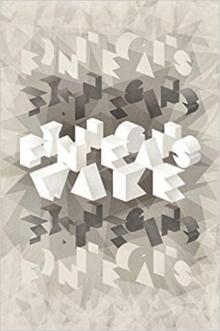 Penguin Classics the Restored Finnegans Wake
Penguin Classics the Restored Finnegans Wake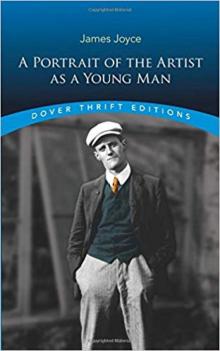 A Portrait of the Artist as a Young Man (Dover Thrift Editions)
A Portrait of the Artist as a Young Man (Dover Thrift Editions)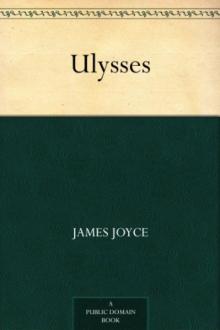 Ulysses
Ulysses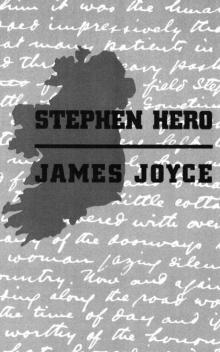 Stephen Hero
Stephen Hero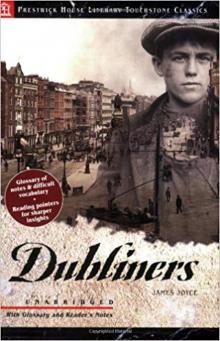 Dubliners
Dubliners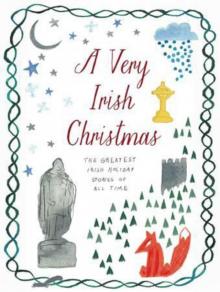 A Very Irish Christmas
A Very Irish Christmas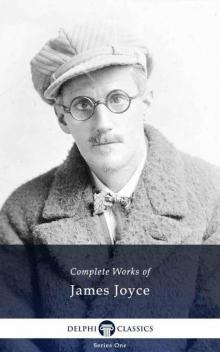 The Complete Works of JAMES JOYCE
The Complete Works of JAMES JOYCE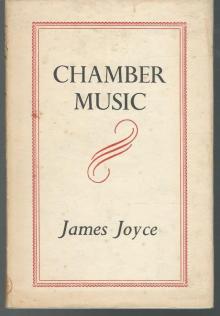 Chamber Music
Chamber Music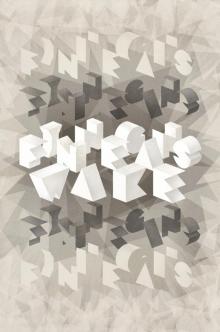 The Restored Finnegans Wake
The Restored Finnegans Wake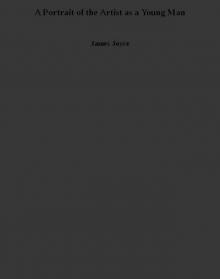 A Portrait of the Artist as a Young Man
A Portrait of the Artist as a Young Man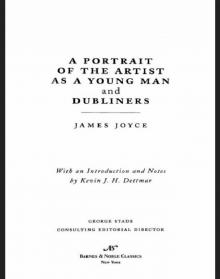 Portrait of the Artist as a Young Man and Dubliners (Barnes & Noble Classics Series)
Portrait of the Artist as a Young Man and Dubliners (Barnes & Noble Classics Series)